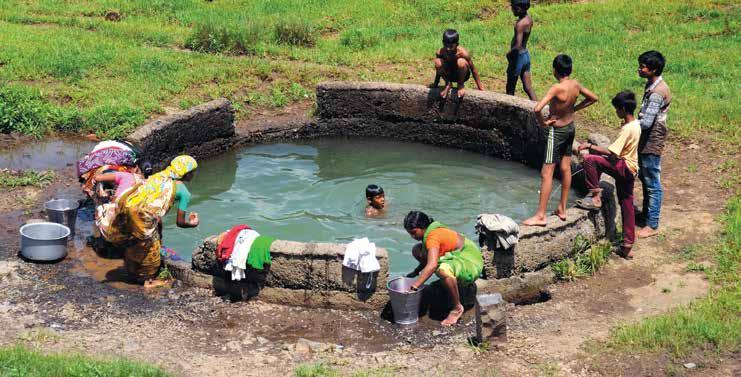
5 minute read
FEATURE – Water at the core of sustainable development
Water at the core of sustainable development
Action on SDG 6 Under the SDG 6 Support Programme, GWP works in partnership with UNEP-DHI and UNDP Cap-Net to assist governments and other key stakeholders to evaluate, diagnose, and improve water governance policies. The aim is to accelerate implementation of work towards SDG 6 and other water-related goals. Efforts are conducted through assisting governments and stakeholders along three stages: (1) strengthening national monitoring frameworks and identifying water resources management challenges; (2) planning appropriate responses to those challenges; and (3) implementing solutions through integrated water resources management, including mobilising funding. By the end of 2019, the programme was supporting planning and implementation activities in 10 countries, while
Advertisement
The Future We Want, United
Nations General Assembly Resolution A/RES/66/288, outcome document of the United Nations Conference on Sustainable Development 2012
Well in Nashik, Maharashtra, India
negotiating collaborations with 60 countries around the monitoring process. The work is implemented mainly by Country Water Partnerships or Regional Water Partnerships, with input from a wide range of local stakeholders with the assistance and guidance of GWP’s global team and UNEP-DHI. Some examples of progress are given here, with more details reported in the ‘regional stories’ sections of this report.
Strengthening national monitoring and reporting
GWP supported five Central African countries to conduct analyses of SDG indicator 6.5.1 baseline studies and identify significant challenges and opportunities. In Jamaica, GWP helped secure seed funding from UN-Water for a four-day training course on SDG 6 monitoring, along with the development of an SDG 6
The Sustainable Development Goal and targets for water
SDG 6: Ensure availability and sustainable management of water and sanitation for all
Target 6.5: By 2030, implement integrated water resources management at all levels, including through transboundary cooperation as appropriate
Global progress towards target 6.5 is monitored through two indicators:
6.5.1: Degree of integrated water resources management implementation
6.5.2: Proportion of transboundary basin area with an operational arrangement for water cooperation
monitoring guide for the Caribbean region. Decentralisation of the monitoring process was advanced in Honduras, through workshops to pilot an adapted version of the SDG 6.5.1 questionnaire targeted at the municipal level.
Piloting the approach in Ghana, Guatemala, Kazakhstan, and Vietnam
Pilot workshops in four countries revealed useful information on how to best design the SDG 6.5.1 workshops and phases 1 and 2 of the programme. The activities included holding multistakeholder workshops, convening task forces, and ensuring ownership by mandated national institutions. Good results were achieved, with Ghana developing a validated and budgeted action plan to introduce more integrated water resources management, Guatemala developing a draft plan in alignment with other key national water development processes, and Vietnam developing seven projects covering the priority issues identified by stakeholders. Significant buy-in was also secured in Kazakhstan, with priority actions identified, including the transfer of water management responsibilities to a new Ministry of Environment. The results of the process implemented in Kazakhstan were presented at a regional dialogue with neighbouring countries, to facilitate cross-country learning. The pilots highlighted several lessons, including the importance of securing national buy-in and ownership, balancing ambition with reality, aligning with ongoing development initiatives, and setting achievable timescales. These insights will be applied during scaling up of the programme.
Cooperation on shared water resources Across the world, more than 260 watersheds cross the political boundaries of two or more countries, with shared river basins accounting for around 80 percent of global river flows. International cooperation on the management of transboundary water resources therefore plays a vital role in supporting sustainable development and promoting peace and stability. Here, GWP’s work focuses on facilitating dialogue across political jurisdictions, learning about water governance and international water law, and improving transboundary water governance.
Progress towards improving transboundary water resources management
GWP’s transboundary water portfolio supports countries as they work towards SDG target 6.5.2, which measures the proportion of transboundary waters with an operational arrangement for water cooperation. In 2019, this work included co-organising a workshop to support ten countries in Central Africa to advance transboundary cooperation and improve SDG 6.5.2 monitoring. Another SDG 6.5.2 workshop advanced progress between Bulgaria and Romania in preparing plans for part of the River Danube.
Cooperation through dialogue
Regional dialogues have proven successful in identifying entry points and building consensus. In 2019, GWP collaborated with other partners to arrange dialogues in Central America, Central Asia, China, and the Mediterranean. The dialogue in Central America contributed to implementation of the Central American Commission for Environment and Development’s Water Agenda and Regional Environmental Strategy, while in China, dialogue helped operationalise a new river basin partnership for the Yangtze basin. Actions by several countries were sparked in the Mediterranean, including the formation of inter-ministerial committees for exploring potential accession to the United Nations Economic Commission for Europe Water Convention.
Improved management and governance
GWP played an important role, supported by the Global Environment Facility, in facilitating cohesion and technically assisting the elaboration of a strategic action programme for the long-term management of the Drin River basin, a transboundary resource shared by Albania, Greece, Kosovo, Montenegro, and North Macedonia.
Sharing knowledge and learning
This component focuses on key subjects of transboundary water governance, including international water law. Highlights from 2019 include investigation of ecological resilience of the River Black, an important tributary of the Yellow River in China; capacity-building for civil society, local authorities, and youth on ecosystem management for climate change in the Volta basin, West Africa; and organisation of a knowledge-exchange visit for delegates from the Drin basin in the western Balkans to visit their peers in the Mekong basin in Southeast Asia.
“The 2030 Agenda fully commits Member States to integrated water resources management and transboundary cooperation over shared water resources.
Putting this into practice will be the most comprehensive step that countries make towards achieving SDG 6.”
United Nations SDG 6 Synthesis Report 2018 on Water and Sanitation









